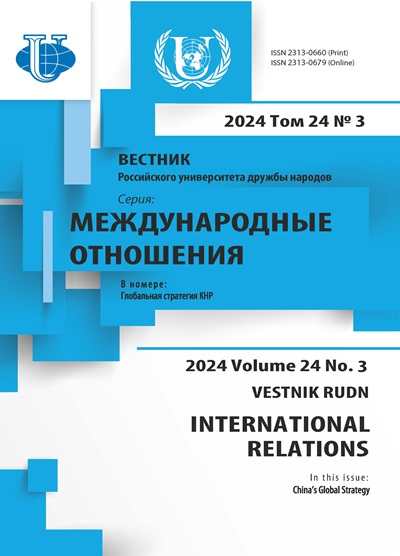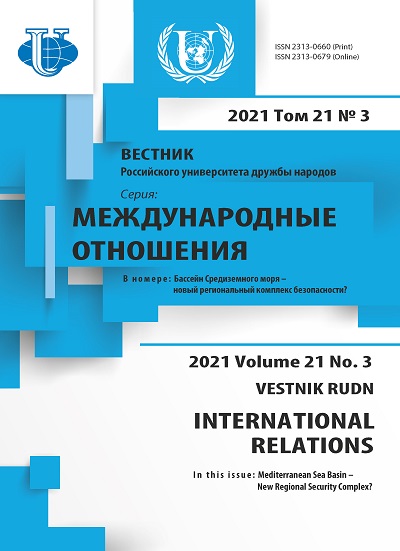Greater Mediterranean Regional Security Complex: Myth or Reality?
- Authors: Aghazada M.M.1
-
Affiliations:
- RUDN University
- Issue: Vol 21, No 3 (2021): Mediterranean Sea Basin – New Regional Security Complex?
- Pages: 429-440
- Section: THEMATIC DOSSIER
- URL: https://journals.rudn.ru/international-relations/article/view/27441
- DOI: https://doi.org/10.22363/2313-0660-2021-21-3-429-440
Cite item
Full Text
Abstract
The study of regional dimensions, including the role of individual regions in the international system, plays a significant role in understanding the formation of a new multipolar world order. Undoubtedly, one of the most important regions is the Great Mediterranean, which is considered to be the cradle of civilization. Located at the crossroads of Asia, Africa and Europe, it has a special status in global economic and political events. The author first defines the concept of the Greater Mediterranean, analyzing it in the short, medium and long term and, accordingly, in a narrow regional, wide regional and global scale. Then the analysis is carried out from the point of view of the regional security complex theory. The purpose of the study is to identify the territory covered by the Greater Mediterranean, as well as the type of regional security complex that it is part of. Since there is no clear, unified definition among Russian and foreign scholars about the geographical boundaries of this region and what it represents, the theoretical justification allows the author not only to determine the limits of the region, but also to give its characteristics, which in turn conditions the relevance of the research. In summary, it is concluded that the Greater Mediterranean constitutes a global-level security complex as it includes states, such as Russia, France, and Great Britain, which have a significant influence in world politics, as well as Turkey, Italy, Israel, and Iran with considerable powerful capabilities that extend beyond their neighbors.
Full Text
Fig. 1. The Greater Mediterranean in a narrow regional scale
Source: compiled by the author.
Fig. 2. The Greater Mediterranean in a wide regional scale
Source: compiled by the author.
Fig. 3. The Greater Mediterranean in a global scale
Source: compiled by the author.
About the authors
Mirmehdi Mirkamil ogly Aghazada
RUDN University
Author for correspondence.
Email: agazade-mm@rudn.ru
ORCID iD: 0000-0002-5129-5553
PhD in History, Senior Lecturer, Department of Theory and History of International Relations
Moscow, Russian FederationReferences
- Bicchi, F. (2011). The Union for the Mediterranean, or the changing context of Euro-Mediterranean relations. Mediterranean Politics, 16(1), 3—19. https://doi.org/10.1080/13629395.2011.547365
- Bicchi, F. (2018). The Mediterranean, between unity and fault line. Global Affairs, 4(2—3), 329—339. https://doi.org/10.1080/23340460.2018.1554394
- Birdişli, F., & Gören, M. (2018). Bölgesel Güvenlik Kompleksi Teorisi Bağlamında Türkiye-İran Arasında Göç ve Sınır Güvenliği. İran Çalışmaları Dergisi, 1(2), 11—38.
- Boening, A. B. (2008b). Regional security through synergistic integration: A Euro-Mediterranean regional security complex. Jean Monnet/Robert Schuman Paper Series, 5(13), 1—14.
- Boening, A. B. (2008а). Pronouncements of its impending demise were exaggerated: The EuroMed partnership morphing into a regional security super complex. Jean Monnet/Robert Schuman Paper Series, 8(12), 1—15.
- Boening, A. B. (2014). The Arab Spring: Re-balancing the Greater Euro-Mediterranean? New York: Springer.
- Buzan, B. & Hansen, L. (2009). The evolution of international security studies. Cambridge: Cambridge University Press.
- Buzan, B. & Waever, O. (2003). Regions and powers: The structure of international security. Cambridge: Cambridge University Press.
- Buzan, B. (1983). People, states and fear: The national security problem in international relations. London: Harvester Press Group.
- Buzan, B., Weaver, O., & De Wilde, J. (1997). Security: A new framework for analysis. Boulder (CO): Lynne Rienner Publishers.
- Chikharev, I. A., & Yarmak, O. V. (2019). The Greater Mediterranean in the discourse of research and expert analytics centers. RUDN Journal of Political Science, 21(1), 99—109. (In Russian). https://doi.org/10.22363/2313-1438-2019-21-1-99-109
- Cusumano, E., & Hofmaier, S. (Eds.). (2020). Projecting resilience across the Mediterranean. London: Palgrave Macmillan.
- Darbouche, H. (2011). Third time lucky? Euro-Mediterranean energy co-operation under the Union for the Mediterranean. Mediterranean Politics, 16(1), 193—211. https://doi.org/10.1080/13629395.2011.547412
- Ehteshami, A., Huber, D., & Paciello, M. C. (Eds.). (2017). The Mediterranean reset: Geopolitics in a new age. Durham: Global Policy.
- Gukasov, A. V., & Kosov, G. V. (2020). Technologies for the formation of a new world order during the “Interregnum” period: On the issue of the formation of new elite zones and territories of disintegration (the case of the Greater Mediterranean). Political Elite Studies, 1(4), 82—103. (In Russian). https://doi.org/10.46539/elit.v1i4.38
- Kosov, G. V. & Tatarkov, D. B. (2020). Middle East node of the Greater Mediterranean in the context of elitological analysis. Political Elite Studies, 1(1), 111—129. (In Russian). https://doi.org/10.46539/elit.v1i1.7
- Kuru, D. (2019). Not international relations ‘mare nostrum’: On the divergence between the Mediterranean and the discipline of international relations. Mediterranean Politics, 26(2), 145—167. https://doi.org/10.1080/13629395.2019.1700674
- Makovskaya, D. V., & Bichakov, S. A. (2019). Ethnic aspect of the “soft power” policy in the implementation of geopolitical projects in the Greater Mediterranean. Political Expertise: POLITEX, 15(3), 392—403. (In Russian). https://doi.org/10.21638/11701/spbu23.2019.305
- Nechaev, V. D., Grishina, A. V., & Kostsova, M. V. (2019). Modern approaches and theories of gender policy: Regional aspect (on the example of the Great Mediterranean Region). Paradigms of History And Social Development, (15—16), 120—124. (In Russian).
- Paciello, M. C., & Pioppi, D. (2020). Working class youth transitions as a litmus test for change: Labour crisis and social conflict in Arab Mediterranean countries. Mediterranean Politics, 26(3), 308—329. https://doi.org/10.1080/13629395.2020.1749814
- Roccu, R., & Voltolini, B. (2017). Framing and reframing the EU’s engagement with the Mediterranean: Examining the security-stability nexus before and after the Arab Uprisings. Mediterranean Politics, 23(1), 1—22. https://doi.org/10.1080/13629395.2017.1358895
- Shakhin, Yu. V. (2020). Methodological problems of studying the Greater Mediterranean. Arkhont, (6), 73—78. (In Russian).
- Soler i Lecha, E. (2010). Converging, diverging and instrumentalizing European security and defence policy in the Mediterranean. Mediterranean Politics, 15(2), 231—248. https://doi.org/10.1080/13629395.2010.485050
- Solovyova, А. А., & Mihalev, A. V. (2019). Prospects for the development of integration cooperation in the Greater Mediterranean region by using the potential of the Arab Maghreb Union. Economy and Management: Theory and Practice, 5(3), 45—52. (In Russian).
- Stoletov, O. V. (2017). Russian “soft power” in the Great Mediterranean. Discourse-P, (2), 117—127. (In Russian).
- Stoletov, O. V., Chikharev, I. A., Moskalenko, O. A., & Makovskaya, D. V. (2019). Geoinformation support of the Mediterranean branch of the Silk Road. InterCarto. InterGIS, 25(1), 102—113. (In Russian). https://doi.org/10.35595/2414-9179-2019-1-25-102-113














